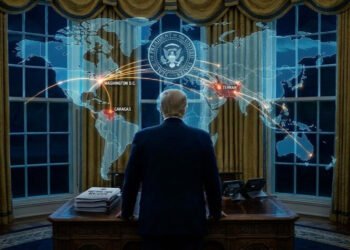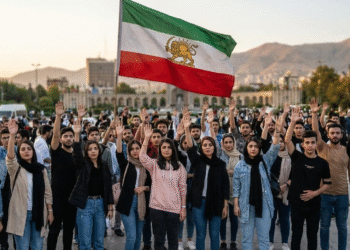“Editor-in-Chief: SHAPOUR-T”
The End of an Era
Under the heaviest political, military, and intelligence pressure in its history, the Islamic Republic appears to be approaching a historic turning point. According to unofficial sources close to Iran’s decision-making centers, Supreme Leader Ali Khamenei is preparing to officially step down from power. Inside his inner circle and among top commanders of the Islamic Revolutionary Guard Corps (IRGC), emergency meetings are being held in anticipation of what many are calling an “irreversible transition.”
An Unsafe Sky
Donald Trump’s unprecedented and direct threat—”Iran’s skies are under our control, and we know where Khamenei is”—has shattered the long-standing strategic calculus in Tehran. Never before has an American president so openly and precisely targeted the Supreme Leader. This time, the threat isn’t just rhetorical; it’s paired with apparent operational readiness and intelligence precision.
The Silence Inside the Leadership—And the Sound of Collapse
Internally, the regime is showing signs of strategic failure. Following Israel’s deep strikes, cyber intrusions, and open targeting of Iranian military infrastructure, Iran’s security apparatus is overwhelmed. Combined with public unrest, civil disobedience, and a near-total loss of legitimacy, Khamenei now finds himself in a position uncannily similar to that of Ayatollah Khomeini in 1988—when Iran ended the Iran–Iraq war by accepting UN Resolution 598. But this time, there’s no formal war—just a quiet collapse.
The Second Cup of Poison—Without an Open War
Khomeini once called the ceasefire a “cup of poison.” Today, it seems Khamenei is being forced to drink one of his own—this time not on the battlefield, but under the shadow of foreign penetration, collapsing domestic control, and eroding military command. Reports suggest elements within the IRGC and Ministry of Intelligence now favor a transition to protect the regime’s core from total destruction.
Negotiating from Weakness—or Escaping Total Annihilation?
According to insider reports, the current debate among top leadership isn’t about resistance—it’s about survival. A proposal reportedly under consideration involves Khamenei stepping down and transferring authority to an interim council. Notably, this move appears to be aimed not at defiance but at damage control—designed to prevent foreign military intervention and internal chaos.
What Comes Next?
Should Khamenei resign in the next 24 hours, Iran would enter one of the most significant transitions in its modern history. His exit would not only close the chapter of the Islamic Republic’s hardline era but open a new and highly uncertain period of power struggle and redefinition—both domestically and geopolitically.
Conclusion
The recent escalation makes it clear that the Islamic Republic can no longer withstand the intertwined pressures of external threat and internal decay. Now, everything hinges on one man’s decision: Ali Khamenei. Will he drink the second cup of poison and step aside, sparing Iran from collapse? Or will another catastrophic miscalculation follow? We are about to find out—perhaps within a single day.

 English
English



























































